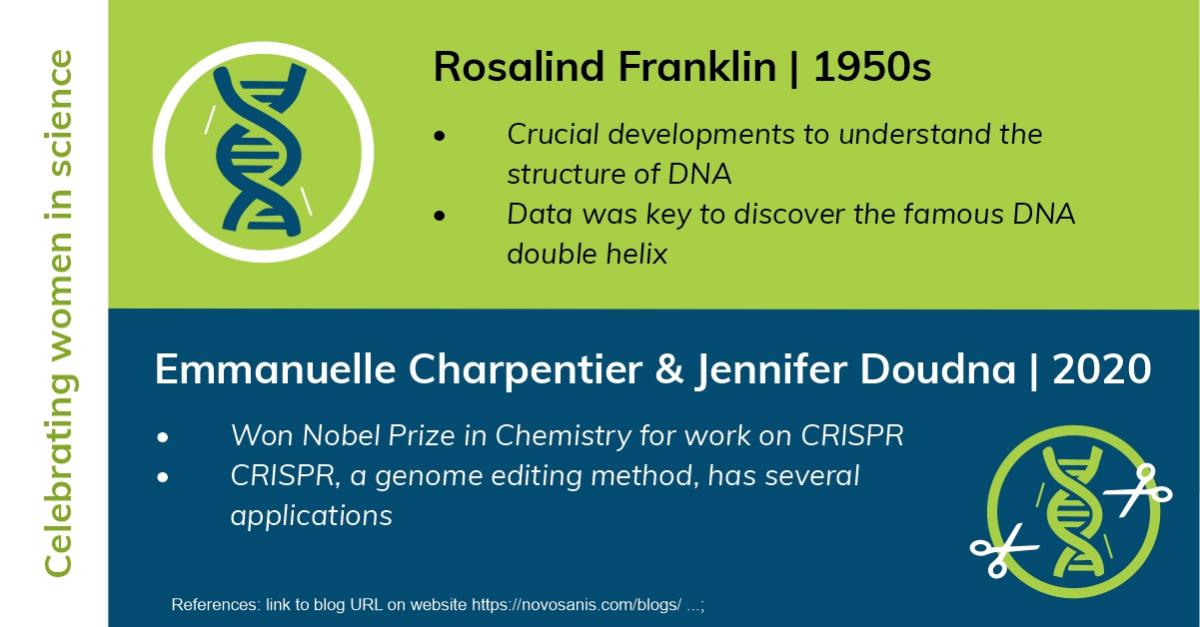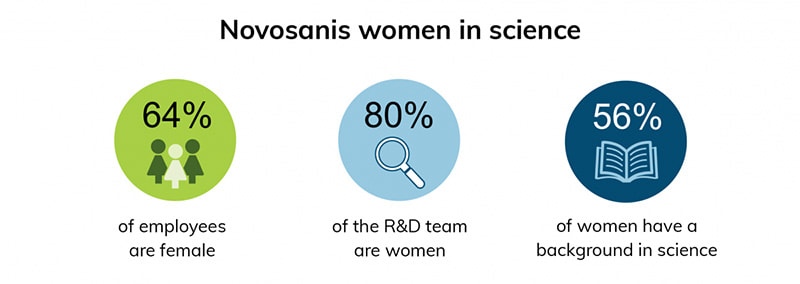Celebrating the Heroines of Science
You are here

Celebrating the Heroines of Science
On International Day of Women and Girls in Science, Novosanis salutes all women that contribute to this field. Several women have made significant contributions in the field of science and their achievements have advanced our understanding of the world. For this years’ Women in Science blog, we want to tribute three key women in science - Rosalind Franklin and Nobel Prize winners Emmanuelle Charpentier and Jennifer Doudna.
Let’s kick-off with Rosalind Franklin who made crucial developments into understanding the double helix structure of DNA. Her data was key in helping Jim Watson and Francis Crick create the famous DNA model (1). Learning the structure of DNA, the building block of life, has revolutionized science and medicine in many ways – it has helped assess an individual’s genetic profile, understand several disease mechanisms, as well as enabled drug development.
Fast-forward from Franklin’s work in the 1950s, to today, women continue to pave the way in science. Emmanuelle Charpentier and Jennifer Doudna were awarded the 2020 Nobel Prize in Chemistry for their work on CRISPR, a genome editing method. The CRISPR technology, allows researchers to cut DNA and edit its sequence at a specific point (2). The CRISPR technique has immense potential in several areas, including cancer research (3). It allows for genomes to be edited in a cost-effective manner, with ease and precision, thereby offering huge scope compared to older gene-editing tools (3).

These discoveries, among others, have allowed developments in cancer research, an area Novosanis is actively working in
Thanks to the work of these women, and several others, great developments have been made in science and health. Novosanis is proud to be able to contribute and build on these achievements. Human Papillomavirus (HPV), a common sexually transmitted infection, can be used to detect cervical cancer. The new CRISPR technology looks promising for HPV detection especially in low and middle income countries (LMICs) because it would not require technical expertise and ancillary machineries (4).
Over the years, our team has been focusing on the potential of urinary HPV-based screening for cervical cancer. Our Colli-Pee® device allows collection of first-void urine, which has shown to contain higher concentrations of HPV (5). Urine sampling offers potential to increase participation in cervical cancer screening programs by reaching non-attenders, a key way to support the World Health Organization’s (WHO) mission to accelerate the eradication of cervical cancer by 2030 (6).
Meet the women in our team
The Novosanis team includes a diverse group of women spread across the world. Our Belgium office consists of women across various divisions and positions. Novosanis is led by a woman CEO, Vanessa Vankerckhoven, who also has a PhD in medical microbiology. Many other women on the team also have a background in science.

Our R&D team comprises of nearly all women, many of whom are looking into cancer research. Michelle Laeremans, PhD, our Scientific Affairs Specialist is working in the field of HPV and cervical cancer, while Stephanie Jordaens, our Biomedical Scientist and PhD student is focusing on cancer biomarker detection for breast and prostate cancer in urine. Additionally, Nette Meers, our Biomedical Engineering Project Manager and Alejandra Ríos Cortés, our Product designer, also work extensively on various research projects.
Alongside our R&D team, we also have several women across other departments of the company, including Production, Sales and Marketing as well as Quality and Regulatory Affairs.
We are proud to create an environment of inspiring women that support the world of science in so many ways. Today is your day -- Happy International Day of Women and Girls in Science!
References:
(1) https://edition.cnn.com/2020/01/27/world/women-in-science-you-should-kno...
(2) https://theconversation.com/what-is-crispr-the-gene-editing-technology-t...
(3) https://www.cancer.gov/news-events/cancer-currents-blog/2020/crispr-canc...
(4) PMID: 31634698
(5) PMID: 30452931
(6) https://www.who.int/news/item/17-11-2020-a-cervical-cancer-free-future-f...
